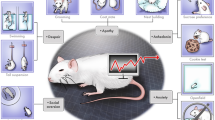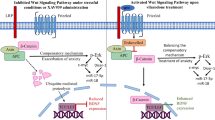Abstract
Serotonin exerts a significant role in the mammalian central nervous system embryogenesis and brain ontogeny. Therefore, we investigate the effect of perinatal fluoxetine (FLX), a selective serotonin reuptake inhibitor, administration on the behavioral expression of adult male Swiss mice. For this purpose, two groups (n = 6 each, and ~ 35 g) of pregnant female Swiss mice were mated. Their offspring were treated with FLX (10 mg/Kg, s.c.) from postnatal day (PND) 5 to 15. At PND 16, one male puppy of each litter was euthanized, and the hippocampus was dissected for RNA analysis. At 70 days of life, the male offspring underwent a behavioral assessment in the open field, object recognition task, light-dark box, tail suspension and rotarod test. According to our results, the programmed animals had a decrease in TPH2, 5HT1a, SERT, BDNF, and LMX1B expression. Also, it was observed less time of immobility in tail suspension test and higher grooming time in the open field test. In the light-dark box test, the FLX-treated offspring had less time in the light side than control. We also observed a low cognitive performance in the object recognition task and poor motor skill learning in the rotarod test. These findings suggest that programming with FLX during the neonatal period alters a hippocampal serotonergic system, promoting anxiety and antidepressant behavior in adults, as well as a low mnemonic capacity.







Similar content being viewed by others
References
Akkerman S, Blokland A, Reneerkens O, van Goethem NP, Bollen E, Gijselaers HJM, Lieben CKJ, Steinbusch HWM, Prickaerts J (2012) Object recognition testing: methodological considerations on exploration and discrimination measures. Behav Brain Res 232:335–347. https://doi.org/10.1016/j.bbr.2012.03.022
Ansorge MS, Morelli E, Gingrich JA (2008) Inhibition of serotonin but not norepinephrine transport during development produces delayed, persistent perturbations of emotional behaviors in mice. J Neurosci 28:199–207. https://doi.org/10.1523/JNEUROSCI.3973-07.2008
Bel, N., & Artigas, F. (1996). In vivo effects of the simultaneous blockade of serotonin and norepinephrine transporters on serotonergic function. Microdialysis studies. The Journal of Pharmacology and Experimental Therapeutics, 278(3), 1064–72. Retrieved from http://www.ncbi.nlm.nih.gov/pubmed/8819487
Bond CM, Johnson JC, Chaudhary V, et al. (2020) Perinatal fluoxetine exposure results in social deficits and reduced monoamine oxidase gene expression in mice. Brain Res. https://doi.org/10.1016/j.brainres.2019.06.001
Brunton PJ (2015) Programming the brain and behaviour by early-life stress: a focus on neuroactive steroids. J Neuroendocrinol 27(6):468–480. https://doi.org/10.1111/jne.12265
Dai JX, Han HL, Tian M, Cao J, Xiu JB, Song NN, Huang Y, Xu TL, Ding YQ, Xu L (2008) Enhanced contextual fear memory in central serotonin-deficient mice. Proc Natl Acad Sci U S A 105:11981–11986. https://doi.org/10.1073/pnas.0801329105
Dai JX, Johnson RL, Ding YQ (2009) Manifold functions of the nail-patella syndrome gene Lmx1b in vertebrate development. Development Growth and Differentiation 51:241–250. https://doi.org/10.1111/j.1440-169X.2008.01083.x
Detke MJ, Rickels M, Lucki I (1995) Active behaviors in the rat forced swimming test differentially produced by serotonergic and noradrenergic antidepressants. Psychopharmacology 121(1):66–72. https://doi.org/10.1007/bf02245592
Ding YQ, Marklund U, Yuan W, Yin J, Wegman L, Ericson J, Deneris E, Johnson RL, Chen ZF (2003) Lmx1b is essential for the development of serotonergic neurons. Nat Neurosci 6:933–938. https://doi.org/10.1038/nn1104
Donovan LJ, Spencer WC, Kitt MM, Eastman BA, Lobur KJ, Jiao K, Silver J, Deneris ES (2019) Lmx1b is required at multiple stages to build expansive serotonergic axon architectures. ELife. 8. https://doi.org/10.7554/eLife.48788
Galindo, L. C. M., Barros, Da M. L. D., Pinheiro, I. L., Santana, R. V. de C., Matos, R. J. B. De, Leandro, C. G., … Manhães De Castro R. (2015). Neonatal serotonin reuptake inhibition reduces hypercaloric diet effects on fat mass and hypothalamic gene expression in adult rats. Int J Dev Neurosci https://doi.org/10.1016/j.ijdevneu.2015.07.004, 46, 76, 81
Galter D, Unsicker K (2000) Sequential activation of the 5-Ht1(a) serotonin receptor and TrkB induces the serotonergic neuronal phenotype. Mol Cell Neurosci 15:446–455. https://doi.org/10.1006/mcne.2000.0841
Gemmel M, Bögi E, Ragan C, Hazlett M, Dubovicky M, van den Hove DL, Oberlander TF, Charlier TD, Pawluski JL (2018) Perinatal selective serotonin reuptake inhibitor medication (SSRI) effects on social behaviors, neurodevelopment and the epigenome. Neurosci Biobehav Rev 85:102–116. https://doi.org/10.1016/j.neubiorev.2017.04.023
Grippo AJ, Beltz TG, Weiss RM, Johnson AK (2006) The effects of chronic fluoxetine treatment on chronic mild stress-induced cardiovascular changes and anhedonia. Biol Psychiatry 59(4):309–316. https://doi.org/10.1016/j.biopsych.2005.07.010
Guidotti G, Calabrese F, Auletta F, Olivier J, Racagni G, Homberg J, Riva MA (2012) Developmental influence of the serotonin transporter on the expression of Npas4 and GABAergic markers: modulation by antidepressant treatment. Neuropsychopharmacology. 37:746–758. https://doi.org/10.1038/npp.2011.252
Hansson SR, Mezey É, Hoffman BJ (1998) Serotonin transporter messenger RNA in the developing rat brain: early expression in serotonergic neurons and transient expression in non- serotonergic neurons. Neuroscience. 83:1185–1201. https://doi.org/10.1016/S0306-4522(97)00444-2
Homberg JR, Molteni R, Calabrese F, Riva MA (2014) The serotonin-BDNF duo: developmental implications for the vulnerability to psychopathology. Neurosci Biobehav Rev 43:35–47. https://doi.org/10.1016/j.neubiorev.2014.03.012
Invernizzi R, Bramante M, Samanin R (1996) Role of 5-HT1A receptors in the effects of acute chronic fluoxetine on extracellular serotonin in the frontal cortex. Pharmacol Biochem Behav 54(1):143–147. https://doi.org/10.1016/0091-3057(95)02159-0
Karpova NN, Lindholm J, Pruunsild P, Timmusk T, Castrén E (2009) Long-lasting behavioural and molecular alterations induced by early postnatal fluoxetine exposure are restored by chronic fluoxetine treatment in adult mice. Eur Neuropsychopharmacol 19:97–108. https://doi.org/10.1016/j.euroneuro.2008.09.002
Katori S, Hamada S, Noguchi Y, Fukuda E, Yamamoto T, Yamamoto H, Hasegawa S, Yagi T (2009) Protocadherin-α family is required for serotonergic projections to appropriately innervate target brain areas. J Neurosci 29:9137–9147. https://doi.org/10.1523/JNEUROSCI.5478-08.2009
Kepser LJ, Homberg JR (2015) The neurodevelopmental effects of serotonin: a behavioural perspective. Behav Brain Res 277:3–13. https://doi.org/10.1016/j.bbr.2014.05.022
Kessler, R. C., Nelson, C. B., McGonagle, K. A., Liu, J., Swartz, M., & Blazer, D. G. (1996). Comorbidity of DSM-III-R major depressive disorder in the general population: results from the US National Comorbidity Survey. The British Journal of Psychiatry. Supplement, (30), 17–30. Retrieved from http://www.ncbi.nlm.nih.gov/pubmed/8864145
Kreiss, D. S., & Lucki, I. (1995). Effects of acute and repeated administration of antidepressant drugs on extracellular levels of 5-hydroxytryptamine measured in vivo. The Journal of Pharmacology and Experimental Therapeutics, 274(2), 866–76. Retrieved from http://www.ncbi.nlm.nih.gov/pubmed/7636750
Lee LJ, Lee LJH (2012) Neonatal fluoxetine exposure alters motor performances of adolescent rats. Dev Neurobiol. https://doi.org/10.1002/dneu.20942
Leger M, Quiedeville A, Bouet V, Haelewyn B, Boulouard M, Schumann-Bard P, Freret T (2013) Object recognition test in mice. Nat Protoc 8:2531–2537. https://doi.org/10.1038/nprot.2013.155
Lesch K-P, Waider J (2012) Serotonin in the modulation of neural plasticity and networks: implications for neurodevelopmental disorders. Neuron 76(1):175–191. https://doi.org/10.1016/j.neuron.2012.09.013
Lin Y, Bloodgood BL, Hauser JL, Lapan AD, Koon AC, Kim TK, Hu LS, Malik AN, Greenberg ME (2008) Activity-dependent regulation of inhibitory synapse development by Npas4. Nature. 455:1198–1204. https://doi.org/10.1038/nature07319
Luoni A, Hulsken S, Cazzaniga G, Racagni G, Homberg JR, Riva MA (2013) Behavioural and neuroplastic properties of chronic lurasidone treatment in serotonin transporter knockout rats. Int J Neuropsychopharmacol 16:1319–1330. https://doi.org/10.1017/S1461145712001332
Machado DG, Cunha MP, Neis VB, Balen GO, Colla A, Grando J, Brocardo PS, Bettio LEB, Capra JC, Rodrigues ALS (2012) Fluoxetine reverses depressive-like behaviors and increases hippocampal acetylcholinesterase activity induced by olfactory bulbectomy. Pharmacol Biochem Behav 103(2):220–229. https://doi.org/10.1016/j.pbb.2012.08.024
Maciag D, Simpson KL, Coppinger D, Lu Y, Wang Y, Lin RCS, Paul IA (2006) Neonatal antidepressant exposure has lasting effects on behavior and serotonin circuitry. Neuropsychopharmacology : Official Publication of the American College of Neuropsychopharmacology 31(1):47–57. https://doi.org/10.1038/sj.npp.1300823
Mahar I, Bambico FR, Mechawar N, Nobrega JN (2014) Stress, serotonin, and hippocampal neurogenesis in relation to depression and antidepressant effects. Neurosci Biobehav Rev 38:173–192. https://doi.org/10.1016/j.neubiorev.2013.11.009
Martinowich K, Lu B (2008) Interaction between BDNF and serotonin: role in mood disorders. Neuropsychopharmacology. 33:73–83. https://doi.org/10.1038/sj.npp.1301571
Mohammad-Zadeh LF, Moses L, Gwaltney-Brant SM (2008) Serotonin: a review. J Vet Pharmacol Ther 31(3):187–199. https://doi.org/10.1111/j.1365-2885.2008.00944.x
Nestler EJ, Hyman SE (2010) Animal models of neuropsychiatric disorders. Nat Neurosci 13(10):1161–1169. https://doi.org/10.1038/nn.2647
Olivier JDA, Vallès A, van Heesch F, Afrasiab-Middelman A, Roelofs JJPM, Jonkers M, Peeters EJ, Korte-Bouws GAH, Dederen JP, Kiliaan AJ, Martens GJ, Schubert D, Homberg JR (2011) Fluoxetine administration to pregnant rats increases anxiety-related behavior in the offspring. Psychopharmacology 217(3):419–432. https://doi.org/10.1007/s00213-011-2299-z
Perez-Caballero L, Torres-Sanchez S, Bravo L, Mico JA, Berrocoso E (2014) Fluoxetine: a case history of its discovery and preclinical development. Expert Opin Drug Discovery 9(5):567–578. https://doi.org/10.1517/17460441.2014.907790
Rodriguez-Porcel, F., Green, D., Khatri, N., Harris, S. S., May, W. L., Lin, R. C. S., & Paul, I. A. (2011). Neonatal exposure of rats to antidepressants affects behavioral reactions to novelty and social interactions in a manner analogous to autistic spectrum disorders. Anatomical Record (Hoboken, N.J. : 2007), 294(10), 1726–35. https://doi.org/10.1002/ar.21402
Rumajogee P, Madeira A, Vergé D, Hamon M, Miquel MC (2002) Up-regulation of the neuronal serotoninergic phenotype in vitro: BDNF and cAMP share Trk B-dependent mechanisms. J Neurochem 83:1525–1528. https://doi.org/10.1046/j.1471-4159.2002.01264.x
Rutter JJ, Gundlah C, Auerbach SB (1994) Increase in extracellular serotonin produced by uptake inhibitors is enhanced after chronic treatment with fluoxetine. Neurosci Lett 171(1–2):183–186. https://doi.org/10.1016/0304-3940(94)90635-1
Sakata K, Woo NH, Martinowich K, Greene JS, Schloesser RJ, Shen L, Lu B (2009) Critical role of promoter IV-driven BDNF transcription in GABAergic transmission and synaptic plasticity in the prefrontal cortex. Proc Natl Acad Sci U S A 106:5942–5947. https://doi.org/10.1073/pnas.0811431106
Sarkar A, Lehto SM, Harty S, Dinan TG, Cryan JF, Burnet PWJ (2016) Psychobiotics and the manipulation of bacteria–gut–brain signals. Trends Neurosci 39:763–781. https://doi.org/10.1016/j.tins.2016.09.002
Schmittgen TD, Livak KJ (2008) Analyzing real-time PCR data by the comparative CT method. Nat Protoc 3(6):1101–1108. https://doi.org/10.1038/nprot.2008.73
Semple BD, Blomgren K, Gimlin K, Ferriero DM, Noble-Haeusslein LJ (2013) Brain development in rodents and humans: identifying benchmarks of maturation and vulnerability to injury across species. Prog Neurobiol 106-107:1–16. https://doi.org/10.1016/j.pneurobio.2013.04.001
Shiotsuki H, Yoshimi K, Shimo Y, Funayama M, Takamatsu Y, Ikeda K, Takahashi R, Kitazawa S, Hattori N (2010) A rotarod test for evaluation of motor skill learning. J Neurosci Methods 189:180–185. https://doi.org/10.1016/j.jneumeth.2010.03.026
Smith K (2014) Mental health: a world of depression. Nature 515(7526):181–181. https://doi.org/10.1038/515180a
Song NN, Xiu JB, Huang Y, Chen JY, Zhang L, Gutknecht L, Lesch KP, Li H, Ding YQ (2011) Adult raphe-specific deletion of Lmx1B leads to central serotonin deficiency. PLoS One 6:e15998. https://doi.org/10.1371/journal.pone.0015998
Sprowles JLN, Hufgard JR, Gutierrez A, Bailey RA, Jablonski SA, Williams MT, Vorhees CV (2017) Differential effects of perinatal exposure to antidepressants on learning and memory, acoustic startle, anxiety, and open-field activity in Sprague-Dawley rats. Int J Dev Neurosci 61:92–111. https://doi.org/10.1016/j.ijdevneu.2017.06.004
Wu YC, Hill RA, Klug M, Van Den Buuse M (2012) Sex-specific and region-specific changes in BDNF-TrkB signalling in the hippocampus of 5-HT1A receptor and BDNF single and double mutant mice. Brain Res 1452:10–17. https://doi.org/10.1016/j.brainres.2012.03.011
Zhao ZQ, Scott M, Chiechio S, Wang JS, Renner KJ, Gereau RW IV et al (2006) Lmx1b is required for maintenance of central serotonergic neurons and mice lacking central serotonergic system exhibit normal locomotor activity. J Neurosci 26:12781–12788. https://doi.org/10.1523/JNEUROSCI.4143-06.2006
Acknowledgements
We thank the National Council for Scientific and Technological Development (Conselho Nacional de Desenvolvimento Científico e Tecnológico – CNPq) and Coordination of Superior Level Staff Improvement (Coordenação de Aperfeiçoamento de Pessoal de Nível Superior – CAPES) for the fellowship granted to graduate students present in this project, the Fundação de Amparo à Pesquisa do Estado de São Paulo to Janaina Sena de Souza (FAPESP, São Paulo, Brazil, processes #2017/07053-3 and #2018/22763-0) and Gisele Giannocco (FAPESP, São Paulo, Brazil, process #2017/23169-1). We also thank Antonio Vicente C. L. da Costa and Ipojucan Pereira de Souza, employers of Federal Rural University of Rio de Janeiro (UFRuralRJ).
Author information
Authors and Affiliations
Corresponding author
Ethics declarations
Conflict of interest
We wish to confirm that there are no conflicts of interest associated with this publication, and there has been no significant financial support for this work that could have influenced its outcome.
Additional information
Publisher’s note
Springer Nature remains neutral with regard to jurisdictional claims in published maps and institutional affiliations.
Rights and permissions
About this article
Cite this article
Laureano-Melo, R., Dos-Santos, R.C., da Conceição, R.R. et al. Perinatal fluoxetine treatment promotes long-term behavioral changes in adult mice. Metab Brain Dis 35, 1341–1351 (2020). https://doi.org/10.1007/s11011-020-00606-2
Received:
Accepted:
Published:
Issue Date:
DOI: https://doi.org/10.1007/s11011-020-00606-2




